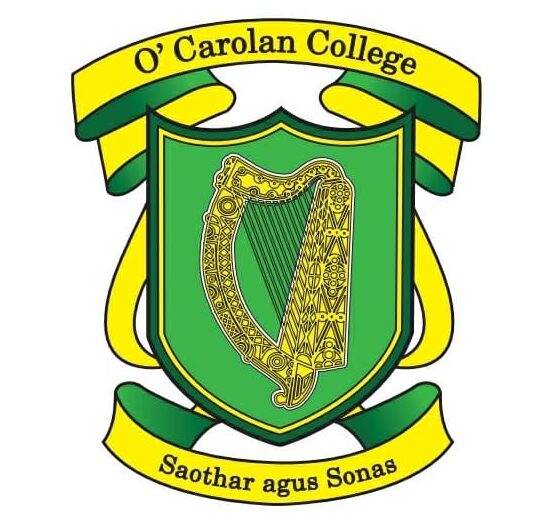Wood Technology & Construction Studies
Department members
Jonathan Irwin, David McConnon, and Stephen Smith.
Provision of the subject in the school
Wood Technology is taught as an optional subject to all students up to Junior Cycle.
The follow-on subject from this is Construction Studies at Leaving Certificate level.
Students follow the course set by the DES syllabus and the subject is common level at Junior Cycle and can achieve Ordinary and Higher Level in Leaving Certificate examinations.
Timetable
| JUNIOR CYCLE | 1 DOUBLE AND 2 SINGLE PERIODS PER WEEK |
| LEAVING CERT | 2 DOUBLE AND 1 SINGLE PERIOD PER WEEK |
Wood Technology
Wood Technology is a subject that will allow students to explore and learn about a key natural resource that nature has provided. Trees and wooden material have a unique relationship with nature and humankind. The sustainable use and management of this natural resource is important as the world faces the challenges of the 21st century. From habitats to construction or recreation to oxygen creation this resource can play a significant role in wellbeing of our planet.
In Wood Technology students will:
- Explore the natural and made world through the medium of design, seeking out opportunities to creatively and innovatively apply the material/resource in making and shaping their environment.
- Explore wood as a material resource which has seen much innovation and change. Technological advances have created significant opportunities to expand the use of wood as a resource for a broad range of applications. However, the uniqueness of this material and craft is that many of the traditional applications and processes are still of value, transcending the test of time.
- Be active learners with student centered learning through collaboration in the pursuit of knowledge in the safe management of the technology classroom environment.
- Develop the relevant knowledge, skills and values to bring ideas from conception to reality in a way that will allow them to be expressive, creative and innovative.
Assessment
The assessment of Wood Technology for the purposes of the Junior Cycle Profile of Achievement (JCPA) will comprise:
- Two Classroom-Based Assessments: Wood science in our environment, and Self-analysis and evaluation
- A project
- A written examination.
Assessment overview
| CBA 1: Wood science in our environment | The teacher’s judgement is recorded for the purpose of subject learning and assessment review, and for the school’s reporting to parents and students. The CBA will be completed within a three-week period during term one of second year. |
| CBA 2: Self-analysis and evaluation | The teacher’s judgement is recorded for the purpose of subject learning and assessment review, and for the school’s reporting to parents and students. The CBA will be completed within a three-week period during term one of third year and will inform the student’s work on the project. |
| Project (70%) | Will be specified and marked by the State Examinations Commission annually. |
| Written examination (30%) | Set and marked by the State Examinations Commission. |
Construction Studies (Leaving Certificate)
Leaving Certificate Construction Studies provides students in the senior cycle of post-primary education with an introduction to the knowledge and skills involved in construction technology and construction materials and processes. This practical subject gives students hands-on experience working with tools and machinery. Students also undertake theoretical and background work for their final examinations which provides the students with useful skills for working in the sector.
The examination has three separate components:
Part I – Construction Theory and Scale Drawing (50%)
- Built Heritage & Planning Permission
- Energy Resources & Sustainability
- Building Structures
- Universal Building Design & Life-Time Use
- Passive House Design
- Building Services
- Structural System – Detail Drawings
- Building & The Environment
Part II – Practical Skills (25%)
- Design: Concept to Manufacture
- Machine Manufacturing Processes
- Manufacturing with Hand Tools
Part III – Course Work (25%)
- Student projects under one of the following four topics: Sustainable Technologies, Construction Technology Details, Heritage Buildings, Furniture Production
- Workshop Experiments on Construction Materials
- Ideally completed before Christmas in 6th Year
Assessment
Students of Construction Studies use a unique range of skills in the design and production of a project in one of these four for assessment as part of their Leaving Certificate:
- Furniture Production
- Heritage Buildings
- Construction Technology
- New Technologies
This project (25%) along with a practical skills test (25%) and a final written paper (50%) on the areas outlined above make Construction Studies a very diverse, interesting and challenging subject. It allows students to develop a true appreciation for the world of construction and provide them with an introduction to courses incorporating construction at third level and a possible career in one of the many facets of the subject.
Facilities
We have two well equipped specialist rooms, furnished with 24 benches, a large variety of hand tools and woodworking machines. This allows all students to experience the environment of a practical workshop situation.
Planning and Preparation
Department meetings are held at the beginning and end of each term. We also discuss department matters on a daily basis as issues arise.
Staff participate in ongoing In-service with the T4 technology subject development group.
Resources
- Textbooks:
Junior Cycle -Wood Technology by Michael Cross
Leaving Certificate – Get Constructive by E. Corcoran, S. King & W. Nolan
Leaving Certificate – Essential Construction Studies Revision Journal by S. Colgan & T. Sheppard
- Construction Components and Models.
- Collection of student project work displayed.
- Use of Internet to research and design.
- Power Point presentations.
- A fully equipped workshop with its array of tools and machinery is of immense value as a resource for the teaching and learning of the subject.
- Educational trips to Coillte sites and modern construction facilities such as Combilift in Monaghan and Kingspan in Kingscourt.
